| Srl | Item |
| 1 |
ID:
180801
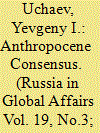

|
|
|
|
|
| Summary/Abstract |
Humanity is facing the highest risk of global existential catastrophe in its
history. What should be done to ensure effective international cooperation
for the sustainable survival of humankind? The article posits that the main
obstacles to international cooperation lie in the field of ideas and mentality.
To overcome these obstacles, a new unifying metanarrative is proposed,
the Anthropocene consensus. It means taking human survival not just as
a goal or interest, but as an ethical Absolute, which serves as a reference
point for assessing all other value systems. Since different forms of social
organization, including at the international level, are unequal in terms
of their impact on the prospects for human survival, the Anthropocene
consensus implies certain principles of the global socio-political order: a
non-absolute nature of sovereignty, a dialogue of countries with different
political regimes, justice, and the priority of global security over national
security. The conclusion suggests that the Anthropocene consensus has a
reasonable chance of theoretical and practical success.
|
|
|
|
|
|
|
|
|
|
|
|
|
|
|
|
| 2 |
ID:
180796
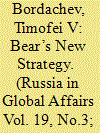

|
|
|
| 3 |
ID:
180791
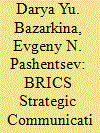

|
|
|
|
|
| Summary/Abstract |
The article examines the current state and development trends of BRICS
strategic communication. Proceeding from the understanding of strategic
communication as projection by a state or an interstate entity of long-term
values, interests, and goals into the minds of audiences by synchronizing
activities in all spheres of public life, the authors analyze the main content
of BRICS strategic communication and assess its prospects amid the
changing world order. The study, conducted from September 2020 to April
2021 on the basis of open sources, made it possible to define the conceptual
basis of BRICS strategic communication; specify the factors underlying
the formation of BRICS strategic communication engendered by the very
nature of cooperation between its member-states; and identify the main
problems and trends in the development of BRICS strategic communication.
The authors conclude that one of the main messages BRICS is sending to
the world through its strategic communication is economic alternativeness,
which allows developing nations and countries under pressure from Western
political, financial, and economic institutions to remain engaged in global
economic processes.
|
|
|
|
|
|
|
|
|
|
|
|
|
|
|
|
| 4 |
ID:
180787
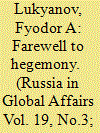

|
|
|
| 5 |
ID:
180794


|
|
|
|
|
| Summary/Abstract |
The post-bipolar world order, transitional in nature, lacks an established
set of institutional norms and rules that would provide a place for arms
control in the general system of international security. Many aspects of the
world order that directly affect the arms control architecture have already
changed, and this factor largely destructs existing arms control regimes.
With the current world order in transition, which combines elements of the
old order and new factors and interdependencies, it would be reasonable to
take a hybrid approach to arms control where a well-structured and legally
binding core addressing nuclear risks would be accompanied by flexible
application of more liberal formats, making it possible to strengthen and
develop periphery areas that were previously not covered by the relevant
rules or lost them due to the cancellation of relevant agreements.
|
|
|
|
|
|
|
|
|
|
|
|
|
|
|
|
| 6 |
ID:
180789


|
|
|
|
|
| Summary/Abstract |
In recent years, Iranian senior officials have laid stress on the Eastern
course in foreign policy. This orientation has been discussed by various
analysts and raised diverse perspectives. The present paper sets to explore
Iran’s Eastern policy in terms of its opportunities and limitations. It
raises the important question of what the main features of Iran’s Eastern
strategy are and what potential and constraints it has.
|
|
|
|
|
|
|
|
|
|
|
|
|
|
|
|
| 7 |
ID:
180790


|
|
|
|
|
| Summary/Abstract |
During the short period of Donald Trump’s presidency, U.S. foreign policy
underwent significant changes. The visible decline in the activity in the
southern and south-eastern Mediterranean in previous years gave way
to Washington’s increased diplomatic activity in the settlement process.
Although the lion’s share of U.S. foreign policy in the MENA region was
aimed at resolving the Arab-Israel confrontation, it did not ignore local
conflicts such as the Libyan crisis, which at first glance has little to do
with the main goals of the U.S. policy the region.
|
|
|
|
|
|
|
|
|
|
|
|
|
|
|
|
| 8 |
ID:
180800


|
|
|
| 9 |
ID:
180797


|
|
|
| 10 |
ID:
180799


|
|
|
| 11 |
ID:
180793


|
|
|
| 12 |
ID:
180802


|
|
|
| 13 |
ID:
180792


|
|
|
| 14 |
ID:
180798


|
|
|
| 15 |
ID:
180795


|
|
|
| 16 |
ID:
180788
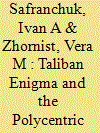

|
|
|
|
|
| Summary/Abstract |
Despite the general view on the Taliban1
as a proxy actor, it has become
capable of pursuing independent domestic and foreign policies. Two basic
options for the Taliban’s role in regional affairs are possible in the future.
Under the Taliban’s rule Afghanistan may become either a scene of rivalry
between great and regional powers, or a neutral zone with a revived buffer
function it performed long before the 1970s. The Taliban’s independent
policies make the latter option quite feasible. However, if global and
regional actors with vested interest do not ensure necessary international
conditions, Afghanistan’s neutral role will not be possible. More broadly, the
entitlement to an independent foreign policy granted by great powers as
they abstain from imposing their influence over Afghanistan suggests a new
feature of the current polycentric world. Instead of trying to enhance their
costly influence on various regions, great powers may prefer to keep each
other from doing so, thus creating new niches for small and middle powers.
|
|
|
|
|
|
|
|
|
|
|
|
|
|
|
|